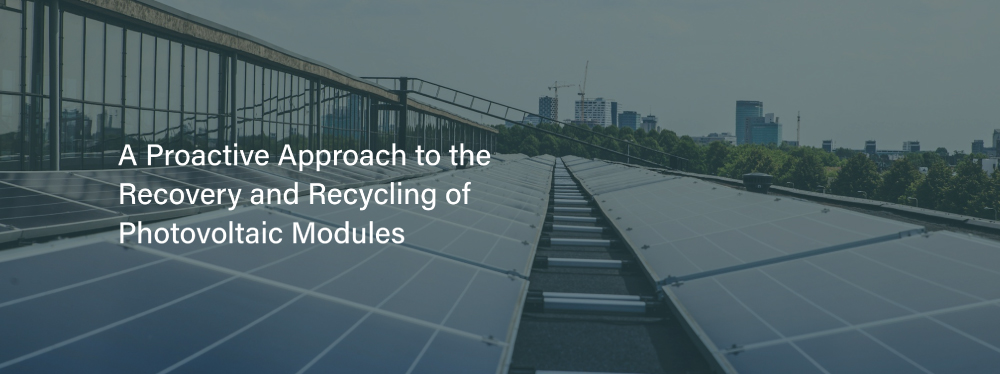APOLLO
A Proactive Approach to the Recovery and Recycling of Photovoltaic Modules: APOLLO
Challenge
There is a pressing need to maximise the recycling of legacy PV modules, to avoid the release of toxic compounds, volatiles and heavy metals, and to actively use them as a resource to help support the manufacture of new PV modules as the global reserves of virgin materials dwindle and especially within the EU pressure increases to reduce reliance on external supply chains.
The challenge is to create a circular approach to link legacy recycling, future production and future recycling.
Solution
APOLLO aims to develop and commercialise PV waste recycling into a high-quality, high-profit method that may salvage valuable materials for use in new PV modules. The comprehensive strategy of the project combines recycling techniques from the past with production strategies and innovative recycling methods to maximise resource recovery and reduce environmental impact. The new technologies are grouped under the 5 key processes: Sorting, Extraction, Refining, Reusing, Tracing and Circularity.
One of the main goals is to establish a pilot line capable of processing 40 tonnes of photovoltaic waste, resulting in the production of 1 tonne of remanufactured silicon and 30 new photovoltaic modules. Implementation of APOLLO across the PV recycling sector is predicted to achieve IMPACTS resulting in a 315% uplift in the economic value recovered, largely due to the glass and Si recovery, at high quality. This gives an overall materials recovery, by mass of 93%.
In addition, APOLLO intends to pioneer the implementation of Blockchain-based Digital Product Passports (DPPs) for photovoltaic components, increasing transparency and traceability throughout the product life cycle.
Objectives, Activities and Results expected / achieved
APOLLO's strategic approach is centred on the efficient separation and recovery of silicon (Si) and glass from crystalline silicon photovoltaic modules (c-Si PV). The new photovoltaic systems production will reintegrate the purified Si and glass. In addition, APOLLO manages a secondary flow of recovered materials, directing them to conventional refinement or purification processes that do not require innovative techniques. Life cycle assessment (LCA), life cycle costing (LCC), and social life cycle assessment (sLCA) framework to ensure transparent and quantifiable decision-making are also a significant part of the project.
The photovoltaic passport introduction will strengthen the integration of next-generation photovoltaic technologies with APOLLO methodologies. These passports contain crucial information such as material composition, embodied energy, historical data and provenance, all protected through blockchain encryption and displayed via labels on the new panels.
The project is structured into 15 work packages (WPs). The initial WPs focus on the main recycling objectives, covering PV dismantling (WP1), material recovery (WP 2, 3 and 4) and material refinement (WP 4 and 5). The crucial part of the technical innovation and resources is concentrated in WPs 2, 3, 4 and 5, making up 48 % of the overall effort and budget allocation, underlining their critical role in achieving the project's objectives.
Complementary objectives anticipating future waste challenges include designing future PV systems (WP6) and establishing traceability through digital passports for PV products (WP7 and 8). The culmination of the technical efforts is presented in a demonstration of a pilot line (WP 9). Exploring the potential of circular business models and evaluating the environmental and social benefits are addressed in WP 10 and 11. Finally, activities related to exploitation and communication are carried out by WP 12 and 13, while technical and financial management is overseen by WP 14 and 15.
Project Reference
Grant Agreement No 101122277Funding

Intervention Region
EuropeTotal Investment
6.942.710,39IPN Investment
424.225,00Total Eligible
6.942.710,39IPN Eligible
424.225,00EC Funding – Total
6.942.710,39EC Funding – IPN
424.225,00Duration
36 MonthsStart Date
2024-01-01End Date
2026-12-31Approval Date
2023-04-13Consortium
Fraunhofer Gesellschaft Zur Forderung Der Angewandten Forschung EvKalyon Gunes Teknolojileri Uretim As
Pikington Technology Management Ltd
Metran Rohstoff-aufbereitungs Gmbh
Minespider Germany Gmbh
Cnet Centre For New Energy Technologies Sa
University Of Leicester
Instituto Pedro Nunes
Solaveni Gmbh
Sintef As
Odtu Gunes Enerjisi Uygulama Ve Ara Stirma Merkezi
University Of Glasgow
Norges Teknisk-naturvitenskapelige Universitet Ntnu
Swansea University
Fenix Tnt Sro
Saule Spolka Akcyjna
Bittner Umwelttechnik Gmbh
Website
https://www.apolloproject.eu/Keywords
Solar photovoltaic,Recycling;
Recyclability;
Crystalline silicon;
Blockchain;
Digital product passports;
Micro-factories;
Sorting;
Extraction;
Refinement;
Reuse;
Tracing;
Circularity.










